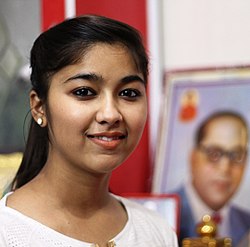Ginni Mahi | |
|---|---|
 | |
| Born | |
| Other names | Gurkanwal Bharti |
| Occupations | Singer, Composer, Lyricist |
| Website | Facebook Profile |
Ginni Mahi is an Indian Punjabi folk, rap and hip-hop [1] singer hailing from Jalandhar, Punjab, India. She became famous with her songs Fan Baba Sahib Di and Danger Chamar that went viral on social media. She attended the Global Media Forum (GMF 2018) in Germany, where she was dubbed as a Young Voice in Equality and Freedom, for speaking up against flogging. [2]
Contents
- Early life
- Career
- Social justice and her music
- Performances
- Discography
- Albums
- Singles
- Commercial Songs
- References
Ginni idolizes Lata Mangeshkar and Shreya Ghoshal in her singing while trying to convey the messages of B. R. Ambedkar in her lyrics. Mahi has performed outside of India, in Canada, Greece, Italy, Germany, and the United Kingdom. She held her first Interview in 2016 on NDTV with Barkha Dutt in Delhi. Subsequently, in 2018 she attended 'Sahitya' Live conversation show organized by AajTak TV channel at New Delhi. She took the stage to speak up for equality of women in the Indian society. [3]